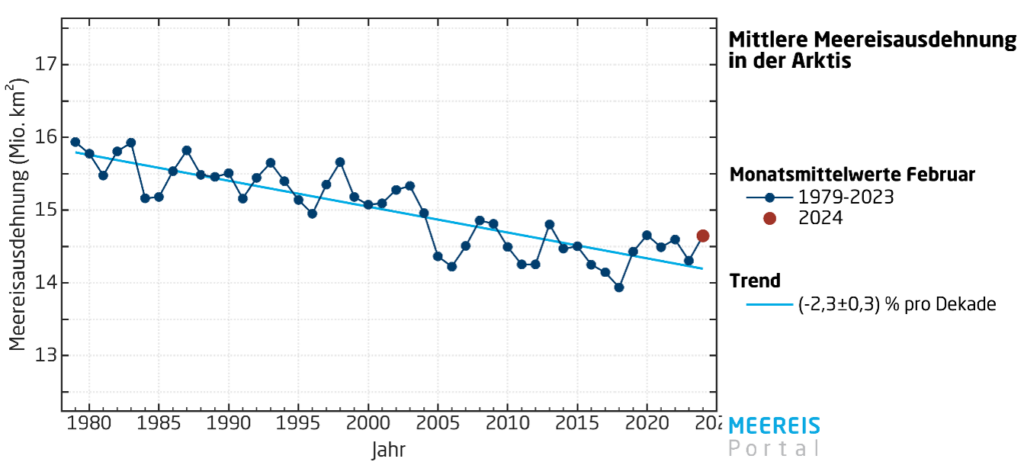Winter sea ice in Arctic stable over past 20 years…has even recovered somewhat.
Hat-tip: Klimanachrichten
Arctic sea ice extent as recorded by Germany’s Alfred Wegener Institute (AWI) in Bremerhaven, Germany, looks at the situation in January 2024. Despite the record temperatures reported, the ice in the Arctic has recovered somewhat.
The slight recovery trend since the Arctic minimum was reached is continuing at the beginning of 2024, with the sea ice extent at the beginning of the year below the average value for the years 1981 – 2010, but in the lower range of the extreme values (minimum / maximum) of this international climate normal period (Figure 1).
If we look at the new reference period 1991 – 2020 introduced by the World Meteorological Organization in 2021, January 2024 is roughly in line with the mean value of this period (see interactive graphic). The average Arctic sea ice extent in January was 13.99 million square kilometers, around 400,000 square kilometers greater than the ice cover in January over the last 20 years (Figure 2). During the month, the extent increased by approximately 29,000 square kilometers per day, which was slower than the average increase from 1981 to 2010.”

Image: Screenshot Meereisportal.de
Among highest in past 20 years
The above chart indeed shows a stable trend over the past 2 decades. According to the AWI:
This year’s maximum sea ice extent most likely occurred on February 27, at 14.94 million square kilometers. The monthly average ice extent in February was 14.65 million square kilometers.”
That makes it higher than 15 of the past 20 years.
Compared to the long-term average for the years 2003 – 2014, it is noticeable that the sea ice cover in the northern Barents Sea is lower, but the Greenland Sea and the northern Baltic Sea in the Gulf of Bothnia and the coastal zones of the Barents Sea have more extensive sea ice areas. This indicates lower and longer-lasting cold periods in these regions.”





[…] Read more at No Tricks Zone […]
[…] Read more at No Tricks Zone […]
[…] Learn extra at No Tips Zone […]
[…] From the NoTricksZone […]
[…] From the NoTricksZone […]
[…] From the NoTricksZone […]
[…] From the NoTricksZone […]
[…] From NoTricksZone […]
[…] Arctic sea ice has continued its recent recovery despite 2023 being claimed as the hottest year on record globally, according to data recorded by Germany’s Alfred Wegener Institute (AWI). From the AWI website (hat tip: Pierre Gosselin): […]
[…] – Germany’s Alfred Wegener Institute Shows January Arctic Sea Ice Now 20 Years Stable! […]
[…] Arctic sea ice has continued its recent recovery despite 2023 being claimed as the hottest year on record globally, according to data recorded by Germany’s Alfred Wegener Institute (AWI). From the AWI website(hat tip: Pierre Gosselin): […]
[…] Arctic sea ice has continued its recent recovery despite 2023 being claimed as the hottest year on record globally, according to data recorded by Germany’s Alfred Wegener Institute (AWI). From the AWI website(hat tip: Pierre Gosselin): […]
[…] Arctic sea ice has continued its recent recovery despite 2023 being claimed as the hottest year on record globally, according to data recorded by Germany’s Alfred Wegener Institute (AWI). From the AWI website (hat tip: Pierre Gosselin): […]
[…] Il ghiaccio marino artico ha continuato la sua recente ripresa nonostante il 2023 sia stato dichiarato l’anno più caldo mai registrato a livello globale, secondo i dati registrati dall’Istituto tedesco Alfred Wegener (AWI). Dal sito web dell’AWI (hat tip: Pierre Gosselin): […]